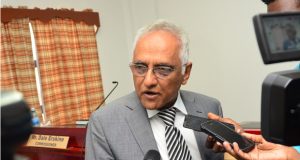…Finance Minister, GRA head knock ‘Grinches’who want to take away public servants’ happiness
…say action underpinned by section 105 of the Income Tax Act Chapter 81:01
MINISTER of Finance, Winston Jordan has defended his decision to give public servants a tax-free retroactive salary increase, in light of Attorney-at-Law, Christopher Ram’s claim that only the National Assembly, by the passage of primary legislation has the power to make any payment exempt from tax.
Ram, in a letter which was published in Stabroek News, said such a power has been exercised only twice since 2004 when the relevant law – section 13 of the Income Tax Act – was amended to make the salary of the Chancellor and the Chief Justice exempt from tax. The other instance was an amendment to the section in 2016 to exempt the income of artistes during festivities certified by the Minister of Tourism.
“Giving the people back pay tax-free is legal…I take my advice from a tax expert and I am assured that everything is above board…I am also reassured that everything is above board by the AG (Attorney General),” said Minister Jordan during an interview with Social Activist, Mark Benschop on Benschop Radio, on Tuesday evening.
Minister Jordan said Government paid back pay, which was tax-free, and promulgated the same regulation which was tabled in Parliament. Jordan asserted that the only reason the regulation was not tabled in Parliament this year is because there is no Parliament, but it was tabled last year. In addition, the minister said Government has been doing well because of public servants and the administration has not forgotten them like the Peoples’ Progressive Party (PPP) regime which, he said, seemed to not like public servants.
Jordan said when the APNU+AFC Government was elected to office in 2015 the minimum wage was a mere $39,540. Government has since increased that by 77 per cent to $70,000. “It took the PPP nine years to raise it to that and took us less than four years to raise the minimum wage to $64,200 and now $70,000…So the same increase, we did in half the time,” said the Finance Minister, adding that Government is continuing do its best for public servants by even granting them the tax-free retroactive increase.
“Ram never commented then…it seems as though public servants have to go through Grinch-like behaviour from people who should be smiling at this time,” said the minister.
Ram, in his letter, had contended that not even a President can exercise the power which Minister Jordan exercised. “In other words, the regulations made by Mr. Jordan are invalid which means that any power they purport to exercise or benefit or obligation they seek to impose is illegal,” he said.
DECISION UNDERPINNED BY LAW

Meanwhile, in defending Minister Jordan’s actions, Commissioner General of GRA, Godfrey Statia said the Finance Minister acted on the advice of the Commissioner General and pursuant to Section 105 of the Income Tax Act Chapter 81:01. Statia in a letter to editor said, Section 105 of the Income Tax Act provides as follows: “the minister may make regulations, subject to negative resolution of the National Assembly, to provide for the remitting wholly or in part of the tax payable by any person or category of persons on such income, in respect of any year of assessment, and in accordance with such conditions as may be specified in the regulations.”
Statia said this section was amended by Act No. 13 of 2008 with a marginal note of “power to remit taxes.” It should be noted that marginal notes are short explanatory notes placed in the margin of the bill which may be seen as the title of the section to which they relate.
According to the GRA boss, prior to 2003, Section 105 of the Act provided that: “the President may remit, wholly or in part the tax payable by any person in respect of any year of assessment if he is satisfied that it will be just and equitable to do so.”
However, in 2003 Section 105 of the Act giving the President the power to remit tax was repealed in the Fiscal Enactment (Amendment) Act No.15 of 2003. However, by Act 13 of 2008, section 105 was reinstated in its current form.
“It is clear that the repeal in 2003 intended to remove the power to remit from the President. It is also apparent that, relying on the intent of the section prior to 2003, the new section 105 reinstated in 2008 was intended to do the same thing, that is, to allow for the remission of tax.
“However, this power to remit was given by the legislature to the Minister instead of the President, under the expressed condition that such power to remit by regulation is subject to the oversight of the National Assembly by negative resolution,” said Statia.

The GRA Commissioner General said this was made clear by the Hansard of July 30, 2008 when the Bill was presented to the National Assembly by the then Minister of Finance, Dr. Ashni Singh. Statia said Section 22(1) of the Interpretation and General Clauses Act Cap. 2:01 provides the expression “subject to negative resolution of the National Assembly” when used in relation to the making of subsidiary legislation shall mean that such subsidiary legislation shall be laid before the National Assembly.
It will be laid with all convenient speed after the making thereof and if the National Assembly within such period as shall be prescribed by standing order of the Assembly resolve that the subsidiary legislation shall be annulled the subsidiary legislation shall be void as from the date of resolution. And the subsidiary legislation shall have effect subject to the specified amendments and the subsidiary legislation shall have effect subject to such amendments.
Statia said Section 105 did not at any time (in 2003 or 2008) refer to section 13 of the Income Tax Act, but conferred discretion in the President and then the minister to remit tax.
“This section it appears (and it is strongly argued) allows for a discretion to be entertained on a temporary basis for a specific time in contrast to section 13 which provides for permanent exemptions which may apply in every year of assessment…
“This was the case in the emoluments of the Chancellor and Chief Justice (referred to by Ram), and “income earned by artistes during festivities which were certified by the Minister of Tourism and approved by the Commissioner- General,” said Statia.
Further, the GRA boss argued that even in section 13 the Minister of Tourism and the
Commissioner General were conferred with discretion. Hence, the conferring of discretion on the subject of remissions by minister is not unheard of under the Income Tax Act. Section 105 adds the same tier of oversight. Ram has completely ignored section 105, and may be essentially ignoring the amendment conveniently.


.jpg)











